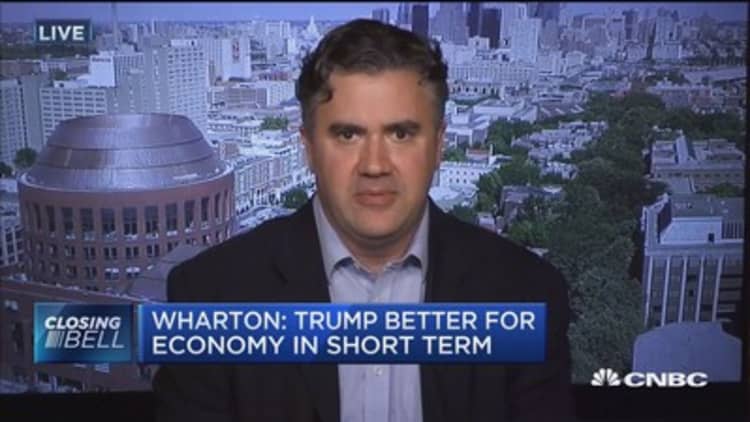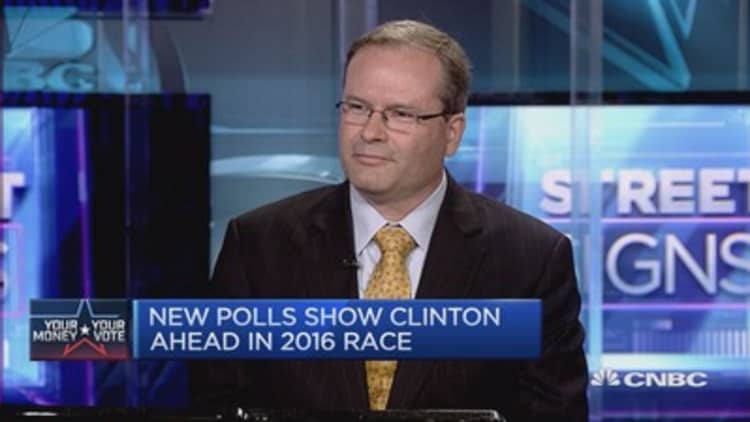When Hillary Clinton was battling Bernie Sanders for the Democratic presidential nomination, she made spirited attacks on Wall Street and corporate America.
"Prosperity can't just be for CEOs and hedge fund managers," Mrs. Clinton said in one speech.
In another: "No bank is too big to fail, and no executive is too powerful to jail."
The plutocracy shrugged. That's not the real Hillary Clinton, they'd say — she's just saying that stuff to pander to progressives. She's a moderate, they'd say — she's just being pulled to the left by Mr. Sanders and his ally in the Senate, Elizabeth Warren. If Mrs. Clinton wins, they'd say, she'll move back to the center when governing.
More from the New York Times:
Haiti and Africa Projects Shed Light onClinton's Public-Private Web
Hacked Transcripts Reveal a Genial Hillary Clinton at Goldman Sachs Events
Hillary Clinton's Campaign Strained to HoneHer Message, Hacked Emails Show
And the recent dumps of emails and other material from WikiLeaks have tended to reinforce that impression. Behind the scenes, according to the transcripts of her paid speeches to the big banks, she often appeared conciliatory toward the financial industry. In one speech, she characterized the blame laid on banks as "politicizing what happened," and even implied that bankers should play a role in setting appropriate regulation: "You guys help us figure it out, and let's make sure that we do it right this time."
Such ideas, of course, would be anathema to Mr. Sanders.

But while some of Mrs. Clinton's detractors spread the view that she is bought and paid for by Wall Street, the WikiLeaks documents point to a slightly different dynamic. Readers may want to take a closer look not at Mrs. Clinton's speech transcripts — in which she does say a lot of what her audience presumably wanted to hear — but to the remarkably telling back-and-forth of emails among her staff members during the campaign. While the full record suggests that Mrs. Clinton may be a pragmatist, the emails sent by her staff hint that she may be inclined to impose heavier regulations on the financial industry than is fully understood.
For people who don't like her coziness with Wall Street, this bit of nuance may be welcomed. For those who take comfort in her familiarity with the world of high finance, the leftward tug she seems to be feeling may disappoint.
In one email, Mandy Grunwald, a consultant to the Clinton campaign, wrote that her understanding at one point last year "from H.R.C. is that she left her call kind of leaning toward endorsing Glass-Steagall."
Mrs. Clinton has long said she won't reinstate the Glass-Steagall Act, the Depression-era law that separated investment banking from commercial banking. The measure, a bulwark of the financial services industry for decades, was repealed during her husband's presidency, a move that has been blamed, in part, for the financial crisis. That Mrs. Clinton even toyed with endorsing Glass-Steagall is a surprise, even though she never went through with it. "I understand that we face phoniness charges if we 'change' our position now — but we face political risks this way, too," Ms. Grunwald wrote.
In another email message, one of Mrs. Clinton's campaign speechwriters, Dan Schwerin, told others on his team that he had met with Dan Geldon, an adviser to Ms. Warren. "He was intently focused on personnel issues, laid out a detailed case against the Bob Rubin school of Democratic policy makers, was very critical of the Obama administration's choices, and explained at length the opposition to Antonio Weiss," a former banker at Lazard who had been nominated by President Obama for a role at the Treasury, over the objections of Ms. Warren. (Mr. Weiss's nomination was later withdrawn under pressure, and he instead became an adviser to the Treasury.)
Mr. Schwerin continued to describe the meeting with Mr. Geldon and the guidance from their respective bosses: "We then carefully went through a list of people they do like, which E.W. sent over to H.R.C. earlier. We have already been in touch with a number of them, and I asked if he would be comfortable introducing me to the others, to which he seemed reasonably amenable."
Reading between the lines, it is hard to believe that Mrs. Clinton plans to dismiss Ms. Warren's concerns about the appointment of Wall Street insiders to critical government posts — which means that it is unlikely that many, if any, individuals with significant experience on Wall Street will end up in positions of power if she were to win. Maybe Mr. Schwerin was just going through the motions to placate Ms. Warren, but his actions and words seemed more genuine than that, and there was very little he said that was dismissive of Ms. Warren's views. (I've written extensively in this column — often to the consternation of some readers — that it is foolish to disqualify individuals for public service because of their experience on Wall Street, but that's an issue for another day.)

Another email by Mr. Schwerin that has been widely circulated in recent days — most frequently to attack Mrs. Clinton as two-faced — may be read to suggest something else. In it, Mr. Schwerin acknowledges that in a speech Mrs. Clinton gave to Deutsche Bank in 2014, he "wrote her a long riff about economic fairness and how the financial industry has lost its way, precisely for the purpose of having something we could show people if ever asked what she was saying behind closed doors for two years to all those fat cats."
He went on to explain that if the speech were released, the "upside would be that when people say she's too close to Wall Street and has taken too much money from bankers, we can point to evidence that she wasn't afraid to speak truth to power. Downside would be that we could then be pushed to release transcripts from all her paid speeches, which would be less helpful though probably not disastrous."
The email clearly demonstrates how focused her team was on how she would be perceived. And it does raise ethical questions about whether the campaign was hoping to deceive the public about what she had said.
But embedded in those is emails was Mr. Schwerin's casual reference to bankers as "fat cats" — which most people on Wall Street consider a pejorative, even if most people on Main Street think of it as a harmless phrase — a tiny clue about how the Clinton machine may really perceive Wall Street. Yes, she may have to play along with them to get paid for speeches and for fund-raising, but you get the vibe from her staff members that the relationship would be somewhat less chummy when it comes to governing and policy.
Finally, there is this: While Mrs. Clinton hasn't endorsed Glass-Steagall, she has publicly endorsed the idea that Wall Street banks should pay a "risk fee" based on their size. In one email exchange that was unearthed, Gene Sperling, another Clinton adviser, estimated that the proposal could mean "Goldman and JP owe $8 billion or $18 billion." Such a sizable charge would be a huge surprise to Wall Street.
Perhaps all these email exchanges are just a lot of two-faced talk. And maybe that's what Wall Street is counting on. But being two-faced can go both ways.


